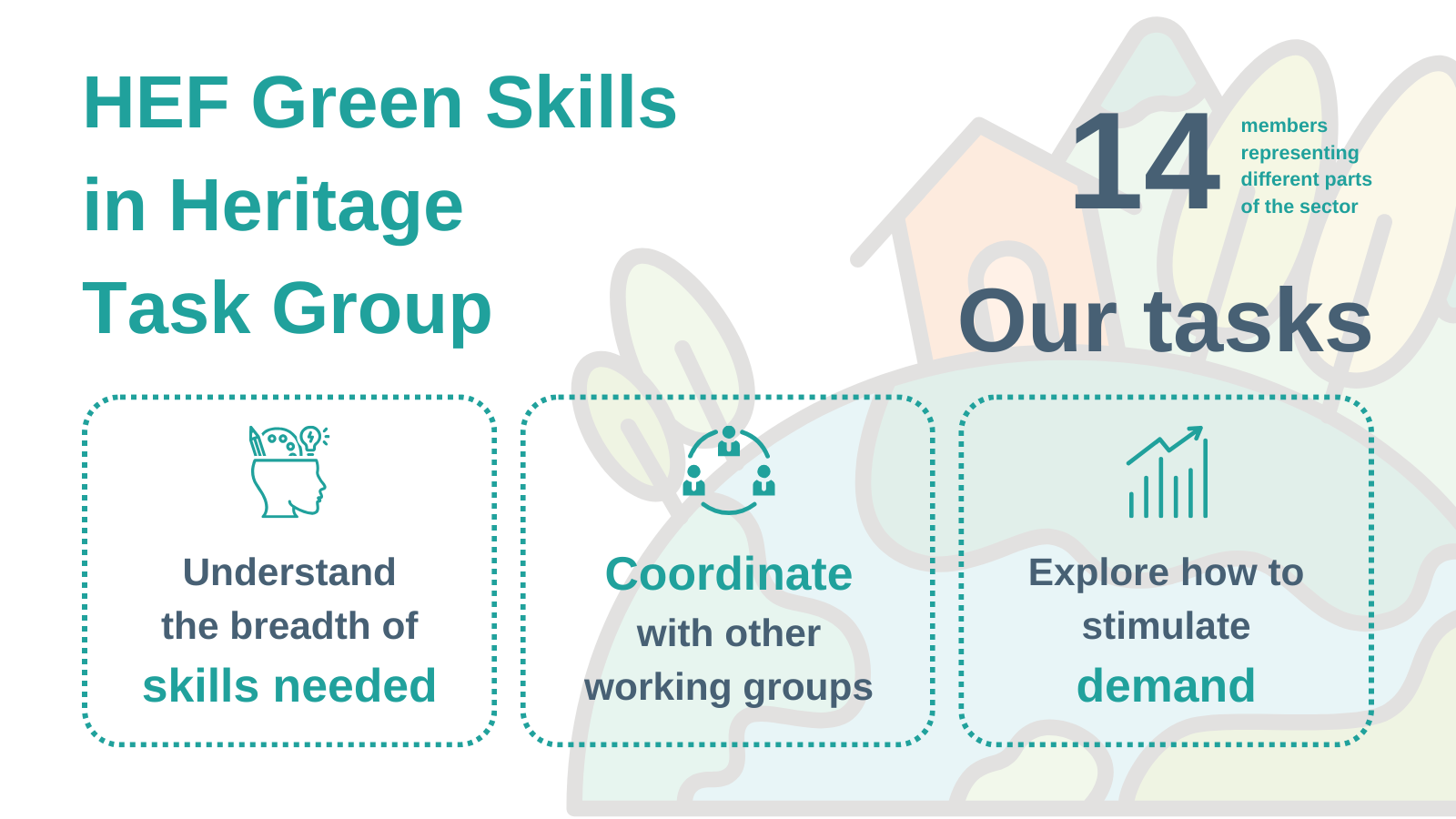For the first interview under our Climate Change theme, we’re pleased to share news from our Task Group Manager Fran Benetti, all about our new Green Skills in Heritage Task Group!
Read on to find out more.
Fran, what can you tell us about the Historic Environment Forum’s Task Group approach?
The Historic Environment Forum (HEF) is a collaborative initiative that brings together senior members of staff from a range of heritage organisations with a national remit to discuss strategic topics. Rather than just being a ‘talking shop’ HEF wants to facilitate real collaborative high-level actions in the sector. This is done through a range of working groups, and I was appointed in September 2023 to manage one of the Task Groups. The HEF Task Groups work on specific tasks, agreed by the members of the Forum, in a (relatively!) short timeframe (6-12 months).
What is the HEF Green Skills in Heritage Task Group? Where did it originate from and what does it aim to achieve?
One of the most pressing challenges in our sector (…in our world, actually!) is climate change. Everyone has to play their part in mitigating the risks related to climate change. Heritage can play a key role in reducing our impact, nurturing sustainable solutions, and encouraging people to take action. A lot of organisations have already taken action, as highlighted in our report Heritage Responds and associated StoryMap. HEF has also supported other organisations on their path to net zero through a collection of useful resources.
What next then? HEF acknowledged that having the right skills in place is critical to deliver environmental sustainability and this is supported by an increasing amount of evidence, also in the heritage sector. For example:
- Historic England’s Report on Local Authority Historic Environment Staff Resources (2023) found that local authorities are aware of the need for climate change adaptation skills, especially among conservation staff.
- Skills gaps have been recently highlighted by the Grosvenor report ‘Heritage and Carbon – Addressing the Skills Gap’.
- The Heritage Pulse initiative explored the topic of skills and found out that green skills are deemed to gain increasing importance in the next 5-10 years.
This is why HEF decided to set up a Task Group related to Green Skills in Heritage and I am delighted to work with a range of colleagues who bring very different perspectives around the table.

What contribution do you think the HEF Green Skills in Heritage Task Group is making towards heritage sector resilience?
The group directly addresses one of the actions identified in the Heritage Sector Resilience Plan ‘Connect heritage jobs / careers to the green jobs market’. It is chaired by Liz Power (Director of Historic Buildings & Places) and has just started its activity.
The tasks that we aim to address are:
- Understand the breadth of green skills needed in the heritage sector to progress the work towards environmental sustainability, and ensure that the sector is able to harness the potential of funding streams related to environmental sustainability for the benefit of the historic environment.
- Coordinate with other working groups to gather evidence on the green skills needed in the heritage sector and assess gaps.
- Explore how to stimulate demand of these specific skills.
In the long term, the fulfilment of these tasks will hopefully lead to new career opportunities in the sector, and to an improvement of the contribution that heritage can make to a future greener UK.
What does success look like? Do you have plans to measure this?
A challenge related to the short-term nature of the Task Group is the difficulty to measure change in the longer term. Strategic changes don’t happen in a day, and hopefully our work will lead to further actions. We have just started to develop our action plan – but in planning it, we will adopt an evaluation mindset and set out proposed measurements to assess the success (or otherwise) of each output and short-term outcome. Alongside this, the HEF Resilience Task Group Manager is starting to think how to measure progress to a more resilient sector in the longer term.
How can colleagues find out more, or get involved?
We’ll publish news on progress and outputs of our work on the HEF website and share news on our social media accounts (LinkedIn & X) – follow us and stay tuned!
Overall, what do you think is most crucial for ensuring a resilient heritage sector?
Resilience is a complex concept, as it includes many facets. In my opinion no organisation can single-handedly work on resilience – collaboration is key to developing an ‘ecology’ to nurture resilience through a deeper understanding of the challenges that we face, discussing and trialling solutions and learning from each other.
This Sector Resilience interview was shared by Fran Benetti as part of our Heritage Sector Resilience Plan activities.
If you’d like to contribute an interview as part of the series, follow the link below to find out more:

